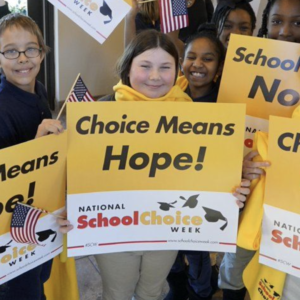The same day Iowa Gov. Kim Reynolds (R) signed one of the nation’s most expansive school choice programs into law, New Hampshire Democrats were fighting to restrict parents’ access to the state’s Education Freedom Accounts. It was the latest political battle between Republicans attempting to push power to parents and Democrats representing the interests of teachers unions.
Iowa’s new law, the “Students First Act,” will allow parents to take about $7,600 of public funding for their students and use it for the education provider of their choice, including private schools. It is a policy education reform advocates call “fund students, not systems.”
“This is a major win for families looking for greater education freedom and choice,” said Jason Bedrick, a research fellow in the Center for Education Policy at The Heritage Foundation. “The Students First Act, which makes education savings accounts available to all Iowa families with children in K-12 grades, puts parents in charge of the education options for their children.”
Sarah Scott, director of grassroots operations at Americans for Prosperity – New Hampshire, also praised the news.
“We’re encouraged to see states across the country realizing the need for choice when it comes to education and passing programs to allow thousands of children to access an education that best fits them. Every family has different needs and we look forward to expanding New Hampshire’s EFA program so that every child has the option to find a customized education.”
In New Hampshire, EFA’s have been surprisingly popular. The number of participants more than doubled in the program’s second year, with about 3,000 participants. The program is income capped at 300 percent above the poverty line — a family of four earning $83,250 or more is ineligible — and about half the participants are eligible for free or reduced lunch.
Republicans have proposed expanding eligibility by raising the income limit or perhaps to students with special circumstances in households above the threshold. But Democrats say the program is already too generous.
Every Democrat in the state legislature voted against the EFA program when it passed in 2021, and many have called for its repeal. On Tuesday, the House Education Committee took up a bill (HB 430) that would ban students already in private schools from being able to participate in the EFA program.
“The EFA voucher program was touted as an opportunity for students who are not succeeding in public school, at a substantial savings to property taxpayers,” said Rep. David Luneau (D-Hopkinton) a prime sponsor of the bill. “But that is not how the program was written. Instead of simply providing options to public school students and reducing taxpayer obligation in the process, New Hampshire’s EFA program was opened to those already in private education, who had previously cost the state nothing.”
Supporters of EFAs reject this argument, noting that every student has a right in New Hampshire to a publicly-funded education. If Luneau’s legislation drove more students into public schools, taxpayers would have to pick up the entire tab – an average of $20,000 per pupil- instead of the approximately $5,000 in EFA funding.
And because students only take the state portion of their funding, the local funding- usually around $15,000 or more- stays in the district to teach fewer students.
And, EFA supporters note, even if the Democrats’ $23 million figure were accurate for the net cost of EFAs, the state is spending $3.5 billion on education this year.
While Granite State Democrats push to limit or end school choice, more states are responding to pressure from parents and expanding opportunities. There are currently 31 states that offer official programs that provide either a scholarship to private school or private school tuition assistance for families, according to the National School Choice Week website. “Of these states, 22 states offer official scholarship programs, eight states offer both scholarship and deduction programs, and one state offers only a deduction program.”
And last week, the Utah House of Representatives passed an $8,000 per pupil choice plan with a formula that benefits lower-income families.
“What an amazing day for our children!” Iowa Gov. Reynolds said as she signed the new law.





